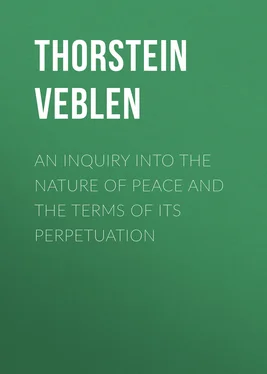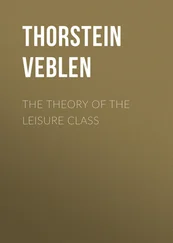Thorstein Veblen - An Inquiry into the Nature of Peace and the Terms of Its Perpetuation
Здесь есть возможность читать онлайн «Thorstein Veblen - An Inquiry into the Nature of Peace and the Terms of Its Perpetuation» — ознакомительный отрывок электронной книги совершенно бесплатно, а после прочтения отрывка купить полную версию. В некоторых случаях можно слушать аудио, скачать через торрент в формате fb2 и присутствует краткое содержание. Жанр: foreign_antique, Политика, Юриспруденция, foreign_edu, на английском языке. Описание произведения, (предисловие) а так же отзывы посетителей доступны на портале библиотеки ЛибКат.
- Название:An Inquiry into the Nature of Peace and the Terms of Its Perpetuation
- Автор:
- Жанр:
- Год:неизвестен
- ISBN:нет данных
- Рейтинг книги:5 / 5. Голосов: 1
-
Избранное:Добавить в избранное
- Отзывы:
-
Ваша оценка:
- 100
- 1
- 2
- 3
- 4
- 5
An Inquiry into the Nature of Peace and the Terms of Its Perpetuation: краткое содержание, описание и аннотация
Предлагаем к чтению аннотацию, описание, краткое содержание или предисловие (зависит от того, что написал сам автор книги «An Inquiry into the Nature of Peace and the Terms of Its Perpetuation»). Если вы не нашли необходимую информацию о книге — напишите в комментариях, мы постараемся отыскать её.
An Inquiry into the Nature of Peace and the Terms of Its Perpetuation — читать онлайн ознакомительный отрывок
Ниже представлен текст книги, разбитый по страницам. Система сохранения места последней прочитанной страницы, позволяет с удобством читать онлайн бесплатно книгу «An Inquiry into the Nature of Peace and the Terms of Its Perpetuation», без необходимости каждый раз заново искать на чём Вы остановились. Поставьте закладку, и сможете в любой момент перейти на страницу, на которой закончили чтение.
Интервал:
Закладка:
By lineal descent the governmental establishments and the powers with which they are vested, in all the Christian nations, are derived from the feudal establishments of the Middle Ages; which, in turn, are of a predatory origin and of an irresponsible character. 2 2 The partial and dubious exception of the Scandinavian countries or of Switzerland need raise no question on this head.
In nearly all instances, but more particularly among the nations that are accounted characteristically modern, the existing establishments have been greatly altered from the mediaeval pattern, by concessive adaptation to later exigencies or by a more or less revolutionary innovation. The degree of their modernity is (conventionally) measured, roughly, by the degree in which they have departed from the mediaeval pattern. Wherever the unavoidable concessions have been shrewdly made with a view to conserving the autonomy and irresponsibility of the governmental establishment, or the "State," and where the state of national sentiment has been led to favor this work of conservation, as, e.g., in the case of Austria, Spain or Prussia, there the modern outcome has been what may be called a Dynastic State. Where, on the other hand, the run of national sentiment has departed notably from the ancient holding ground of loyal abnegation, and has enforced a measure of revolutionary innovation, as in the case of France or of the English-speaking peoples, there the modern outcome has been an (ostensibly) democratic commonwealth of ungraded citizens. But the contrast so indicated is a contrast of divergent variants rather than of opposites. These two type-forms may be taken as the extreme and inclusive limits of variation among the governmental establishments with which the modern world is furnished. 3 3 Cf., e.g., Eduard Meyer, England: its political organisation and development . ch. ii.
The effectual difference between these two theoretically contrasted types of governmental establishments is doubtless grave enough, and for many purposes it is consequential, but it is after all not of such a nature as need greatly detain the argument at this point. The two differ less, in effect, in that range of their functioning which comes in question here than in their bearing on the community's fortunes apart from questions of war and peace. In all cases there stand over in this bearing certain primary characteristics of the ancient régime, which all these modern establishments have in common, though not all in an equal degree of preservation and effectiveness. They are, e.g., all vested with certain attributes of "sovereignty." In all cases the citizen still proves on closer attention to be in some measure a "subject" of the State, in that he is invariably conceived to owe a "duty" to the constituted authorities in one respect and another. All civilised governments take cognizance of Treason, Sedition, and the like; and all good citizens are not only content but profoundly insistent on the clear duty of the citizen on this head. The bias of loyalty is not a matter on which argument is tolerated. By virtue of this bias of loyalty, or "civic duty"—which still has much of the color of feudal allegiance—the governmental establishment is within its rights in coercively controlling and directing the actions of the citizen, or subject, in those respects that so lie within his duty; as also in authoritatively turning his abilities to account for the purposes that so lie within the governmental discretion, as, e.g., the Common Defense.
These rights and powers still remain to the governmental establishment even at the widest democratic departure from that ancient pattern of masterful tutelage and usufruct that marked the old-fashioned patrimonial State,—and that still marks the better preserved ones among its modern derivatives. And so intrinsic to these governmental establishments are these discretionary powers, and by so unfailing a popular bias are they still accounted a matter of course and of axiomatic necessity, that they have invariably been retained also among the attributes of those democratic governments that trace their origin to a revolutionary break with the old order.
To many, all this will seem a pedantic taking note of commonplaces,—as if it were worth while remarking that the existing governments are vested with the indispensable attributes of government. Yet history records an instance at variance with this axiomatic rule, a rule which is held to be an unavoidable deliverance of common sense. And it is by no means an altogether unique instance. It may serve to show that these characteristic and unimpeachable powers that invest all current governmental establishments are, after all, to be rated as the marks of a particular species of governments, and not characteristics of the genus of governmental establishments at large. These powers answer to an acquired bias, not to an underlying trait of human nature; a matter of habit, not of heredity.
Such an historical instance is the so-called Republic, or Commonwealth, of Iceland—tenth to thirteenth centuries. Its case is looked on by students of history as a spectacular anomaly, because it admitted none of these primary powers of government in its constituted authorities. And yet, for contrast with these matter-of-course preconceptions of these students of history, it is well to note that in the deliberations of those ancients who installed the Republic for the management of their joint concerns, any inclusion of such powers in its competency appears never to have been contemplated, not even to the extent of its being rejected. This singularity—as it would be rated by modern statesmen and students—was in no degree a new departure in state-making on the part of the founders of the Republic. They had no knowledge of such powers, duties and accountabilities, except as unwholesome features of a novel and alien scheme of irresponsible oppression that was sought to be imposed on them by Harald Fairhair, and which they incontinently made it their chief and immediate business to evade. They also set up no joint or collective establishment with powers for the Common Defense, nor does it appear that such a notion had occurred to them.
In the history of its installation there is no hint that the men who set up this Icelandic Commonwealth had any sense of the need, or even of the feasibility, of such a coercive government as would be involved in concerted preparation for the common defense. Subjection to personal rule, or to official rule in any degree of attenuation, was not comprised in their traditional experience of citizenship; and it was necessarily out of the elements comprised in this traditional experience that the new structure would have to be built up. The new commonwealth was necessarily erected on the premises afforded by the received scheme of use and wont; and this received scheme had come down out of pre-feudal conditions, without having passed under the discipline of that régime of coercion which the feudal system had imposed on the rest of Europe, and so had established as an "immemorial usage" and a "second nature" among the populations of Christendom. The resulting character of the Icelandic Commonwealth is sufficiently striking when contrasted with the case of the English commonwealth of the seventeenth century, or the later French and American republics. These, all and several, came out of a protracted experience in feudalistic state-making and State policy; and the common defense—frequently on the offensive—with its necessary coercive machinery and its submissive loyalty, consequently would take the central place in the resulting civic structure.
To close the tale of the Icelandic commonwealth it may be added that their republic of insubordinate citizens presently fell into default, systematic misuse, under the disorders brought on by an accumulation of wealth, and that it died of legal fiction and constitutional formalities after some experience at the hands of able and ambitious statesmen in contact with an alien government drawn on the coercive plan. The clay vessel failed to make good among the iron pots, and so proved its unfitness to survive in the world of Christian nations,—very much as the Chinese are today at the mercy of the defensive rapacity of the Powers.
Читать дальшеИнтервал:
Закладка:
Похожие книги на «An Inquiry into the Nature of Peace and the Terms of Its Perpetuation»
Представляем Вашему вниманию похожие книги на «An Inquiry into the Nature of Peace and the Terms of Its Perpetuation» списком для выбора. Мы отобрали схожую по названию и смыслу литературу в надежде предоставить читателям больше вариантов отыскать новые, интересные, ещё непрочитанные произведения.
Обсуждение, отзывы о книге «An Inquiry into the Nature of Peace and the Terms of Its Perpetuation» и просто собственные мнения читателей. Оставьте ваши комментарии, напишите, что Вы думаете о произведении, его смысле или главных героях. Укажите что конкретно понравилось, а что нет, и почему Вы так считаете.












